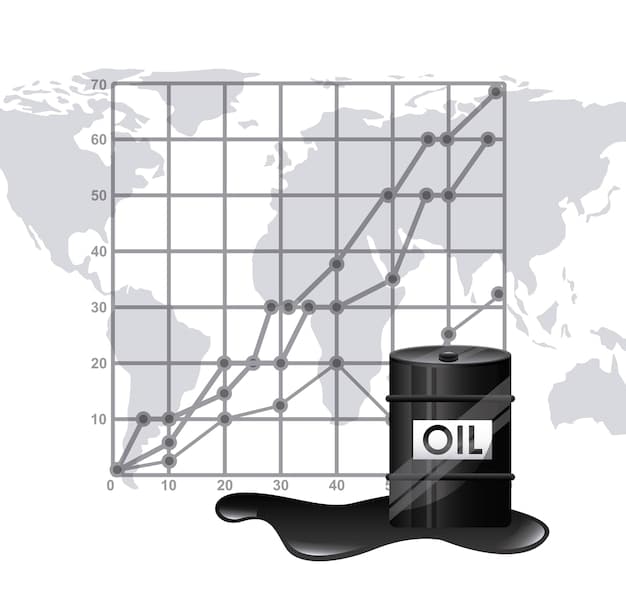Geopolitical Instability: Analyzing the Impact on US Energy Security

Analyzing the impact of geopolitical instability on global energy markets reveals significant implications for US energy security, affecting supply chains, prices, and strategic energy policies aimed at ensuring a stable and resilient energy future.
The intricate relationship between geopolitics and energy is increasingly critical, especially for the United States. Analyzing the impact of geopolitical instability on global energy markets is essential to understanding its profound implications for US energy security, which encompasses the accessibility, affordability, and reliability of energy resources.
Understanding Geopolitical Instability and Energy Markets
Geopolitical instability refers to the risks and uncertainties associated with political events, conflicts, and tensions across the globe. These instabilities profoundly impact energy markets, which are inherently global due to the interconnected nature of energy production, distribution, and consumption.
Key Factors Contributing to Geopolitical Instability
Several factors contribute to global geopolitical instability. These include armed conflicts and wars, political regime changes, sanctions, trade disputes, and shifts in international alliances.
- Armed Conflicts and Wars: Disrupt energy production and infrastructure, leading to price spikes and supply shortages.
- Political Regime Changes: Can alter contractual agreements, nationalize assets, and shift energy policies.
- Economic Sanctions: Limit the flow of energy resources from sanctioned countries, affecting global supply.
- Trade Disputes: Create uncertainty in energy trade, affecting investment decisions and market stability.
These factors collectively create an environment of unpredictability, which necessitates a robust framework for analyzing and mitigating potential risks.

Impact on Global Energy Supply Chains
Global energy supply chains are particularly vulnerable to geopolitical shocks. These supply chains involve complex networks of production, transportation, and distribution, any disruption to which can have significant repercussions.
Critical Chokepoints and Transit Routes
Certain geographical locations, known as chokepoints, are critical for the transit of oil and natural gas. These include the Strait of Hormuz, the Suez Canal, and the Malacca Strait. Disruptions in these areas can lead to significant delays and increased transportation costs.
For example, tensions in the Middle East, particularly around the Strait of Hormuz, pose a perennial threat to global oil supplies. Similarly, political instability in regions through which major pipelines pass, such as Eastern Europe, can disrupt natural gas flows to Europe.
- Strait of Hormuz: A vital passage for oil exports from the Middle East.
- Suez Canal: Connects the Red Sea and the Mediterranean, facilitating energy shipments between Asia and Europe.
- Malacca Strait: A key route for oil tankers moving between the Indian and Pacific Oceans.
Securing these chokepoints is essential for maintaining the stability of global energy markets and mitigating the impact of geopolitical risks.
Price Volatility in Energy Markets
Price volatility is a direct consequence of geopolitical instability. Uncertainty surrounding supply and demand leads to fluctuations in energy prices, affecting consumers and businesses alike.
Factors Influencing Price Spikes
Several factors can trigger sudden and significant price spikes in energy markets. These include unexpected supply disruptions, increased demand due to seasonal changes or economic growth, and speculative trading activities.
For instance, a military conflict in a major oil-producing region can lead to a rapid decrease in supply, driving prices upward. Similarly, the imposition of sanctions on a significant energy exporter can reduce the availability of resources, resulting in price increases.
- Supply Disruptions: Result in immediate price increases due to scarcity.
- Increased Demand: Can strain available resources, leading to competitive bidding and higher prices.
- Speculative Trading: Exacerbates price volatility through rapid buying and selling based on market sentiment.
Governments and regulatory bodies often intervene to mitigate extreme price volatility, employing measures such as releasing strategic petroleum reserves and implementing price controls.

Implications for US Energy Security
US energy security is significantly impacted by geopolitical events occurring globally. As a major consumer and producer of energy, the US must navigate the complexities of the international energy landscape to ensure a stable and reliable energy supply.
Vulnerability to Global Energy Shocks
Despite its increasing domestic energy production, the US remains vulnerable to global energy shocks. Fluctuations in global oil prices, influenced by geopolitical events, directly affect the cost of gasoline and other petroleum-based products for American consumers.
Moreover, disruptions to global energy supply chains can impact the availability of certain energy resources, affecting industries that rely on these inputs. This necessitates a comprehensive approach to energy security that includes diversifying energy sources, strengthening domestic production, and fostering international cooperation.
The US government employs several strategies to enhance energy security, including maintaining strategic petroleum reserves, promoting renewable energy development, and engaging in diplomatic efforts to stabilize global energy markets.
Strategic Energy Policies and Mitigation Strategies
To mitigate the impact of geopolitical instability, the US implements a range of strategic energy policies. These policies aim to diversify energy sources, enhance domestic production, and strengthen international partnerships.
Diversification of Energy Sources
One of the primary strategies for enhancing energy security is diversifying energy sources. This includes increasing the use of renewable energy sources such as solar, wind, and hydropower, as well as promoting the development of alternative fuels.
By reducing reliance on any single energy source, the US can mitigate the impact of supply disruptions caused by geopolitical events. This diversification also fosters innovation and creates new economic opportunities in the renewable energy sector.
- Renewable Energy: Provides a stable and sustainable energy supply, reducing dependence on fossil fuels.
- Alternative Fuels: Such as biofuels and hydrogen, offer alternatives to traditional petroleum-based products.
- Energy Efficiency: Reducing overall energy consumption through efficiency improvements lowers demand and vulnerability to supply shocks.
These policies collectively contribute to a more resilient and secure energy future for the United States.
The Role of International Cooperation
International cooperation is essential for addressing the challenges posed by geopolitical instability. Collaborative efforts among nations can help stabilize energy markets, ensure reliable supply chains, and promote sustainable energy development.
Collaborative Efforts and Agreements
The US engages in various international initiatives to foster cooperation in the energy sector. These include participation in international energy organizations, bilateral agreements with energy-producing countries, and collaborative research and development projects.
By working with other nations, the US can leverage collective resources and expertise to address common challenges, such as energy security, climate change, and sustainable development. These partnerships also promote mutual understanding and trust, which are essential for navigating complex geopolitical landscapes.
- International Energy Agency (IEA): Facilitates cooperation among member countries on energy policy and security.
- Bilateral Agreements: Establish frameworks for energy trade, investment, and technology transfer.
- Joint Research Projects: Promote innovation and the development of sustainable energy solutions.
These collaborative efforts are crucial for creating a stable and secure global energy environment, benefiting both the US and its international partners.
| Key Point | Brief Description |
|---|---|
| 🌍 Geopolitical Risks | Conflicts and instability can disrupt energy markets globally. |
| ⚠️ Supply Chain Vulnerabilities | Critical chokepoints and transit routes are prone to disruption. |
| 📈 Price Volatility | Market prices fluctuate due to supply and demand uncertainties. |
| 🛡️ US Energy Security | The US diversifies energy sources to mitigate global shocks. |
FAQ
▼
Geopolitical instability refers to the uncertainties and risks associated with political events, conflicts, and tensions occurring around the world that impact international relations and agreements.
▼
Geopolitical instability can disrupt energy production, transportation, and distribution, leading to supply shortages, price volatility, and increased uncertainty in the energy markets.
▼
Key chokepoints include the Strait of Hormuz, the Suez Canal, and the Malacca Strait. These are critical transit routes for oil and natural gas shipments globally.
▼
US energy security refers to the nation’s ability to access affordable, reliable, and sustainable energy resources to support its economy, national security, and the well-being of its citizens.
▼
Strategies include diversifying energy sources, increasing domestic energy production, maintaining strategic petroleum reserves, and fostering international cooperation to stabilize global energy markets.
Conclusion
Analyzing the impact of geopolitical instability on global energy markets is critical for the United States and the world at large. By understanding the dynamics at play, implementing strategic policies, and fostering international cooperation, we can work towards a more stable and secure energy future, mitigating the risks posed by geopolitical uncertainties.





